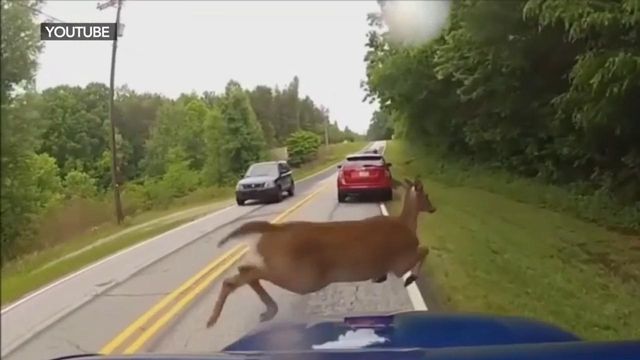Watch out: This is the time of year when accidents with deer increase
We've all seen the warning signs and the evidence laying on the side of the road. It's hard to avoid a deer if one crosses in front of your car.
Posted — UpdatedAccording to AAA, there were more than 17,000 crashes last year in North Carolina involving animals. Of those, 90 percent are believed to involve deer. Nearly half of those crashes happen between October and December.
Now that it's October, Auto Body 911 shop owner Thomas Hobbs is geared for another bumper crop of accidents. He was checking out an Audi that hit a deer. He estimated the cost would be $8,700.
"I don't know if it was two deer that did this one one deer," Hobbs said from his Raleigh shop.
With comprehensive insurance, it's all covered.
"It'll probably go up 300 percent. Three times as many deer-damaged cars will come in," Hobbs said of the number of vehicles he'll be asked to fix due to drivers hitting deer.
That's because bucks have their hormones firing on all cylinders, looking for mates.
"They're a little bit distracted this time of year. So they tend not to be as careful when crossing roadways," said Falyn Owens, a state wildlife biologist.
We asked her about deer whistles, these gadgets you can pick up for $8 that you can stick on your front bumper. They emit a high-frequency sound the deer, not the drivers, can hear. In theory, the sound scares the deer away from the road.
"Unfortunately, there hasn't been any evidence that deer are affected by those whistles," Owens said. "Whether or not they can hear them, they seem not to change their behavior any significant way."
Owens points to three university studies that have shown the whistles don't prevent deer collisions. She said the deer might hear the sound, which grows louder with speed.
"But also the faster you're going, the less opportunity a deer has to react and do anything differently," Owens said.
Meaning, you're likely to hit the deer first.
Deer, like us, are commuters. They travel the most between 5-8 in the morning and 5-8 in the evening. If you're on a collision course, it's best to brake hard and stay the course. Swerve and you might end up hitting something even worse.
Hobbs has heard 20 years of deer tales from shaken-up drivers.
"We're as much a repair shop as we are a Dr. Phil episode," Hobbs said.
He tells them just be thankful it's your car that needs surgery and not you.
Related Topics
• Credits
Copyright 2024 by Capitol Broadcasting Company. All rights reserved. This material may not be published, broadcast, rewritten or redistributed.





